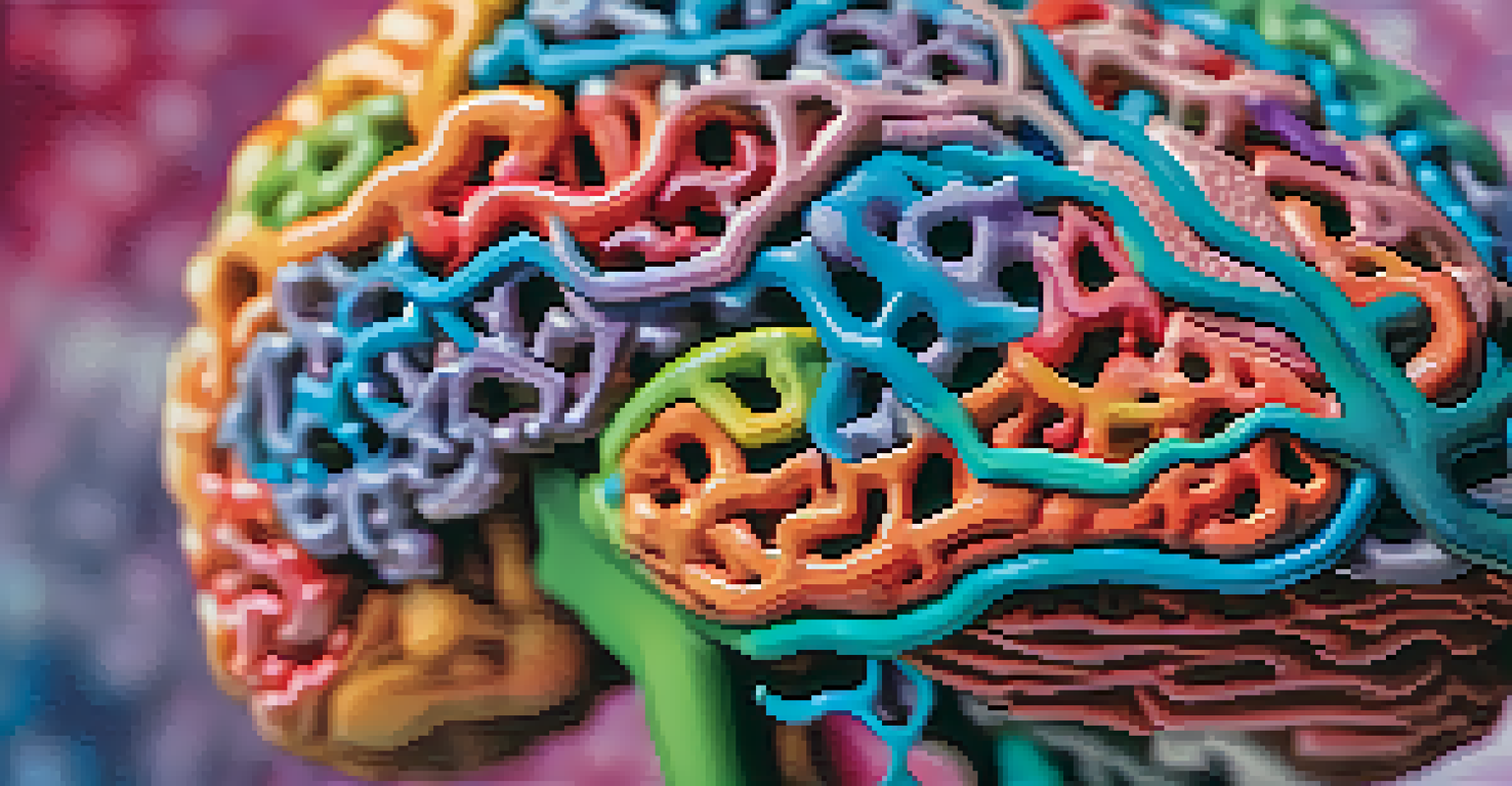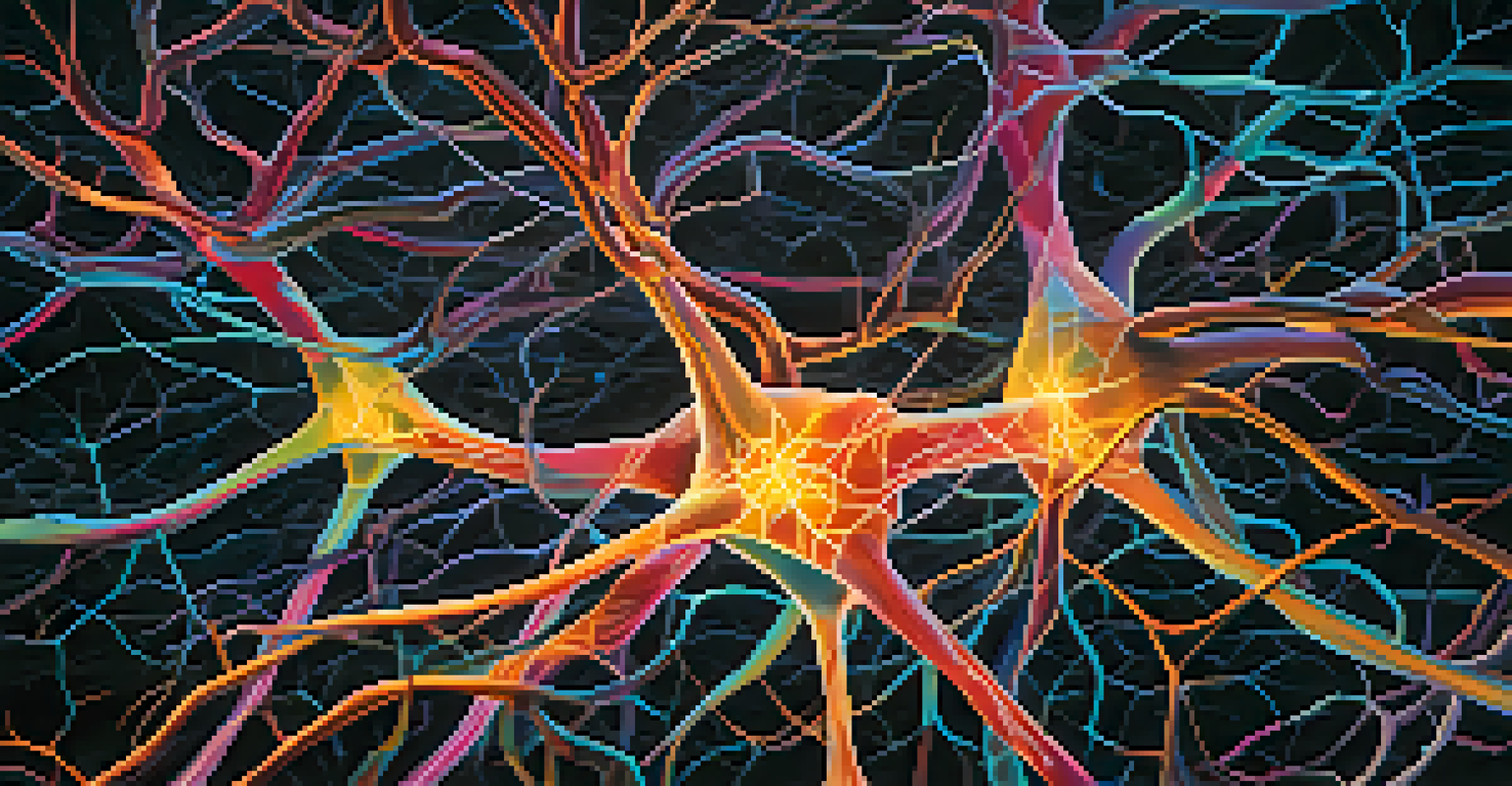Neuroscience in Mental Health: Understanding Disorders

The Role of Neuroscience in Mental Health
Neuroscience plays a pivotal role in unraveling the complexities of mental health. By studying the brain's structure and function, researchers can identify how various disorders affect our thoughts and behaviors. This understanding helps bridge the gap between biology and psychology, offering a comprehensive view of mental health challenges.
The brain is a world consisting of a number of unexplored continents and great stretches of unknown territory.
For instance, conditions like depression and anxiety have identifiable neurological patterns that can be observed through brain imaging techniques. These tools allow scientists to visualize changes in brain activity and identify the specific areas that contribute to these disorders. Thus, neuroscience not only enhances our understanding but also opens new avenues for treatment.
In essence, neuroscience serves as a foundation for both diagnosis and therapy, guiding mental health professionals in developing effective interventions. By integrating this scientific approach, we can foster a more robust framework for understanding and treating mental health disorders.
Common Mental Health Disorders Explained
Mental health disorders encompass a wide range of conditions, each with unique symptoms and challenges. Disorders such as anxiety, depression, bipolar disorder, and schizophrenia impact millions globally, yet they often remain misunderstood. By examining these disorders through a neuroscience lens, we can demystify their biological underpinnings.

For example, anxiety disorders are linked to heightened activity in certain areas of the brain, leading to excessive worry and fear. On the other hand, depression is associated with imbalances in neurotransmitters like serotonin and dopamine. Understanding these connections allows for more targeted treatment strategies.
Neuroscience Unveils Mental Disorders
Studying the brain's structure and function helps identify the neurological patterns underlying mental health disorders, bridging biology and psychology.
Recognizing that mental health disorders have legitimate neurological roots is crucial for reducing stigma. This comprehension fosters empathy and encourages individuals to seek help, knowing that they are not alone in their struggles.
Neurotransmitters and Their Impact
Neurotransmitters are the brain's chemical messengers, playing a vital role in regulating mood and behavior. Key neurotransmitters like serotonin, dopamine, and norepinephrine influence how we feel and respond to various situations. An imbalance in these chemicals can lead to mental health disorders, highlighting their significance in neuroscience.
Neuroscience provides the foundation for understanding mental processes and the underlying mechanisms of mental health disorders.
For instance, low levels of serotonin are commonly linked to depression, while dopamine is crucial for motivation and reward. Understanding these relationships helps researchers develop medications that target specific neurotransmitter systems, improving treatment outcomes. This approach allows for a more personalized strategy in managing mental health.
Moreover, lifestyle factors such as diet and exercise can impact neurotransmitter levels. By promoting healthy habits, individuals can positively influence their mental health and overall well-being, illustrating the interconnectedness of neuroscience and daily life.
The Brain's Plasticity and Recovery
Neuroplasticity refers to the brain's ability to reorganize itself by forming new neural connections throughout life. This remarkable adaptability is crucial in the context of mental health recovery. It means that even after experiencing a disorder, individuals have the potential to heal and reshape their brain's pathways.
Therapeutic techniques such as cognitive-behavioral therapy (CBT) leverage neuroplasticity by encouraging new thought patterns and behaviors. As individuals practice these new skills, their brains can physically change, enhancing their coping mechanisms. This process highlights the importance of consistent effort in recovery.
Neurotransmitters and Mood Regulation
Key neurotransmitters like serotonin and dopamine play crucial roles in mood regulation, and their imbalances can lead to mental health issues.
Understanding neuroplasticity instills hope in those struggling with mental health issues. It reinforces the belief that change is possible and encourages individuals to actively participate in their healing journey.
The Impact of Stress on Mental Health
Stress is a common experience that can significantly affect mental health. When faced with stressors, the brain releases hormones like cortisol, which can alter brain function over time. Chronic stress can lead to structural changes in the brain, increasing vulnerability to mental health disorders.
For example, prolonged stress can shrink the hippocampus, an area critical for learning and memory, which may contribute to anxiety and depression. Understanding this relationship emphasizes the need for effective stress management strategies to protect mental health.
Incorporating stress-reduction techniques such as mindfulness, exercise, and social support can mitigate the damaging effects of stress. By prioritizing mental well-being, individuals can enhance their resilience against future challenges.
Innovative Treatments in Neuroscience
Advancements in neuroscience have paved the way for innovative treatments for mental health disorders. Techniques such as transcranial magnetic stimulation (TMS) and deep brain stimulation (DBS) are gaining traction as effective options for individuals who do not respond well to traditional therapies. These methods target specific brain areas to alleviate symptoms.
TMS, for instance, uses magnetic fields to stimulate nerve cells in the brain, showing promise in treating depression. Similarly, DBS involves implanting electrodes in the brain, allowing for precise modulation of neural activity. These cutting-edge approaches represent a shift towards more personalized and effective mental health care.
Neuroplasticity Aids Recovery
The brain's ability to reorganize itself, known as neuroplasticity, offers hope for recovery by allowing individuals to reshape their thought patterns through therapeutic techniques.
As research continues to evolve, we can expect even more breakthroughs in mental health treatment. This progress not only offers hope to those affected by disorders but also highlights the importance of ongoing investment in neuroscience.
The Future of Mental Health and Neuroscience
The intersection of neuroscience and mental health is a rapidly evolving field, promising exciting developments for the future. As technology advances, we can expect more precise diagnostic tools and personalized treatment options. This shift will enable mental health professionals to tailor interventions to individual needs, improving outcomes.
Additionally, greater awareness and understanding of mental health disorders will contribute to reducing stigma. By fostering open conversations about mental health, we create an environment where individuals feel comfortable seeking help. This cultural shift is essential for promoting overall mental well-being.

Looking ahead, interdisciplinary collaboration will be key in furthering our understanding of mental health. By combining insights from neuroscience, psychology, and social sciences, we can develop comprehensive strategies to support individuals on their mental health journeys.